
When Chontel Duncan asks her children to name one thing they love about her, the first thing they will say is: “Mummy is strong.”
And, at first glance, it would be easy to write that description off as merely physical. After all, the Queensland fitness influencer and gym owner is a striking 186cm tall and has, on more than one occasion, gone viral for her six-pack abs – both during and after pregnancy.
The successful personal trainer and mother-of-five, who boasts more than 1.2 million followers on Instagram alone, puts the work in.
Juggling multiple businesses, nurturing her relationship with husband and partner, Sam, and their big family is undeniably chaotic.
But that’s the space in which Chontel, who was diagnosed with ADHD last year, thrives.
“High pressure or high stress is high performance for me,” she says. “We make sure we are always filling our cup so there is never any resentment.
“We prioritise our health.”
Unsurprisingly, the gym is fundamental to the 36-year-old’s self-care.
If that means getting up at 4.30am to squeeze in a workout, that’s her priority.
“You take 10-30 minutes to be a little bit selfish, but turn it into something selfless because it’s then a benefit to everyone else or everything that you touch,” she says.
But Chontel’s strength goes far beyond her muscular build. Seated in her sleek, spotless office above her studio in Redland Bay, southeast of Brisbane, it’s immediately clear what Jeremiah, nine, Swayde, seven, Paris, four, and twins Havana and Justice, three, mean when they say their mumma is strong.
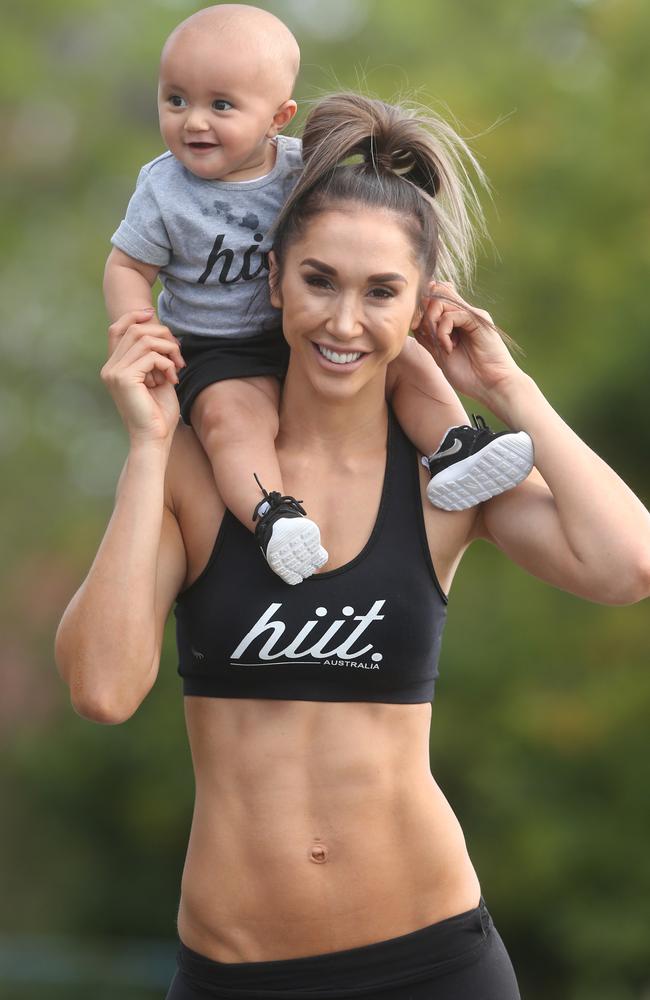
“I’m responsible for giving them a perception of what females are – and we are strong, we are capable. We are breaking what society says women need to be,” she says.
“A status, a perfect image is the least interesting thing about me. The most interesting part about me is the journey that I went on and am still on.”
Both Chontel, who is an ambassador for Lady Musgrave Trust which provides supportive housing for young Queensland women, and Sam, had difficult childhoods.
Sam was raised by his “courageous” mum, who fled his violent stepdad in New Zealand with the help of women’s refuges and a family friend. Sam was 12 when he, his mum and three siblings started a new life in Australia.
“His mum was always in and out of hospital,” Chontel says.
In Brisbane, Sam grew up in public housing and, as the oldest of four boys, he stepped up when his mum had to work night shifts, looking after his siblings. When he and Chontel met at Alexandra Hills State High School, in Redland City, she was 14 and he was 15, with the youngest brother Sam would care for just four years old.
“It was a very lucky placement from the universe that we met each other when we did,” Chontel says.
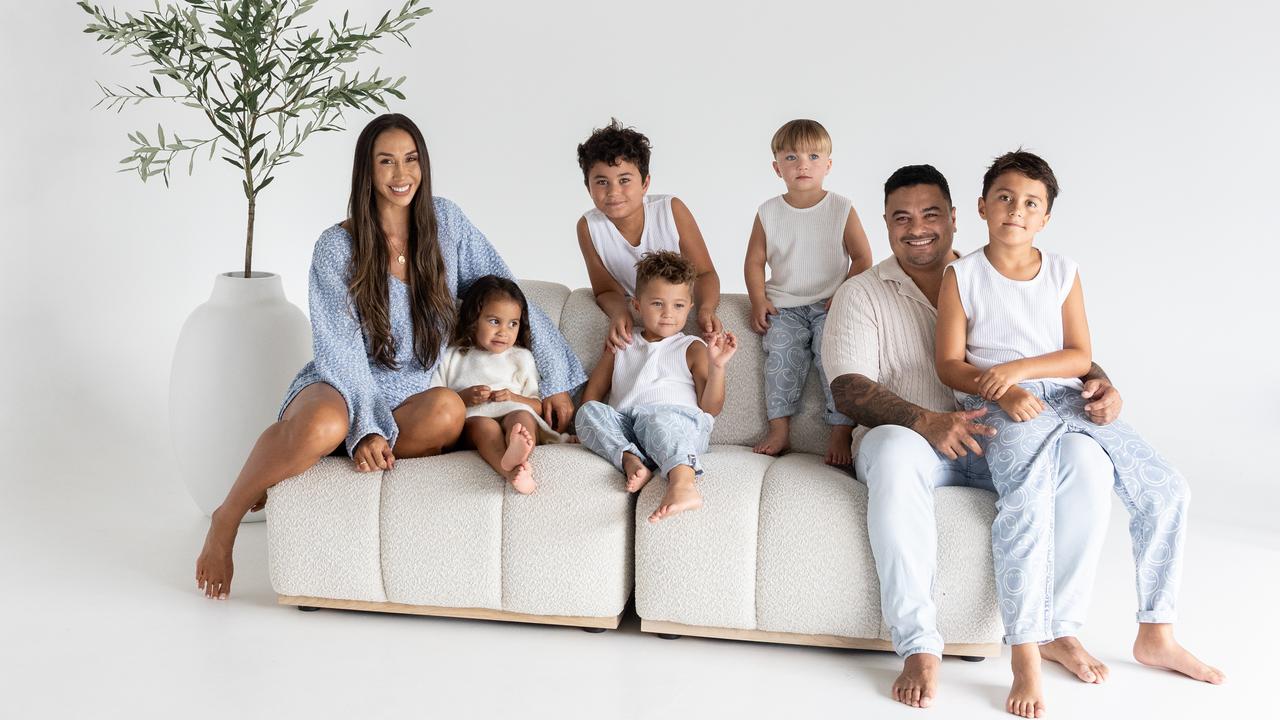
Despite all she shares online and within her gym community, Chontel has always remained intensely private about her own upbringing. She now describes it as a mix of “love, challenges, and resilience” and says, while there were special memories, there were also difficult times, particularly around the breakdown of her parents’ marriage.
The family faced financial struggles, instability, and the emotions that come with major change.
“I think that’s where my people-pleasing habit came from, trying to create a better environment so maybe it’s a good day today,” she says.
It’s that environment, she says, that also taught her to “hustle” from a young age. Her experiences shaped her into someone who values “security, connection, and support”.
“Normal things like my birthday weren’t important. I don’t think I ever had anyone at my sports day events,” she says.
“I fell into putting myself out there. That’s where my drive for hustling came from because I had to find how to fit in society when I didn’t have that support network. I didn’t have that encouragement. I had to find friends to get me to things, like Scouts, I’d get lifts with their parents. I was just always trying to figure out how to get it all done.
“When I met Sam, he just didn’t have a judgmental bone in his body – we related.”
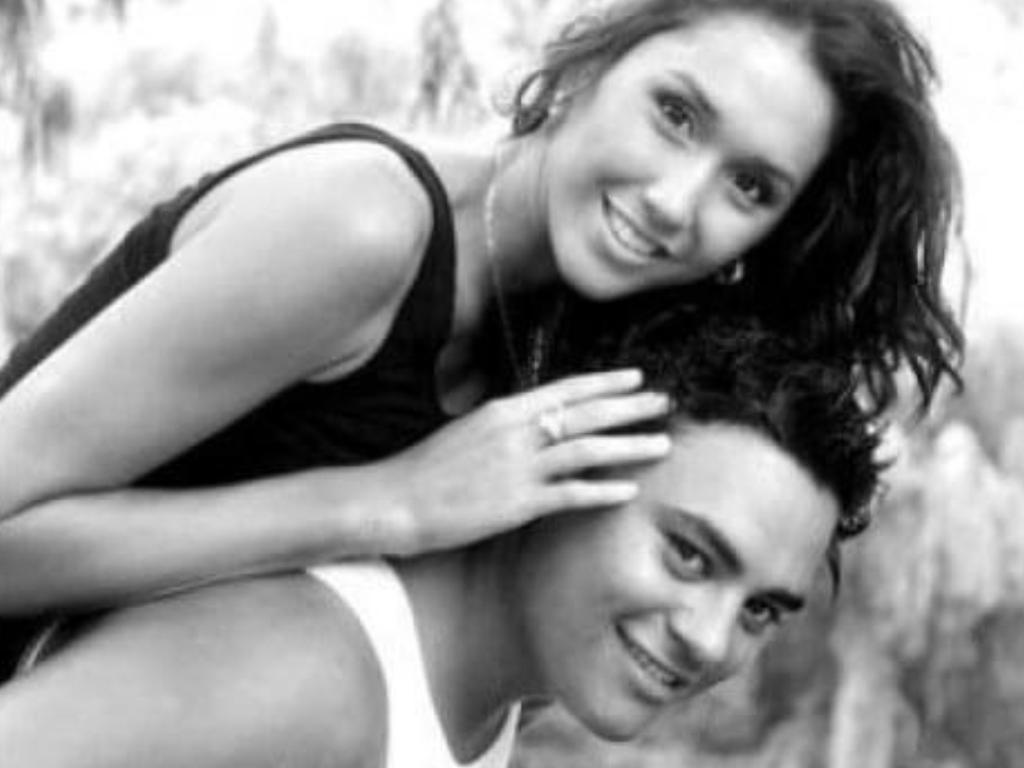
When Chontel’s parents divorced just after she’d finished school, they lost the family home.
Sam and Chontel moved into a share house with four friends. They lived on two-minute noodles. They worked multiple jobs. Chontel would count her coins and calculate exactly how much fuel she would need to get to and from work for the week.
“It was really hard to just figure out: How am I going to get out of this? How am I going to break the cycle? How am I going to get a career when I can’t actually study, I don’t have the opportunity to? So I learnt to gather people,” shesays.
From walking dogs, washing cars and working in reception to Hungry Jacks, a shoe store and triple shifts at the Alexandra Hills Hotel, Chontel did it all to make ends meet.
“I would work at the bain-marie, then the restaurant a little bit later and the nightclub upstairs at night. To get the extra dollars, I said yes to everything,” she says. “I did bikini competitions at nightclubs to win cash prizes, I was literally trying anything.”
But, by 21, Chontel says she had hit a real low point.
“I was just like, I’m so unhappy, I actually don’t know if I’ve got any future desires or vision for myself, I think this is literally going to be me for the rest of my life,” she says.
“I don’t think I’m good at one single thing and I feel dumb. I feel like I’m at the bottom of the food chain. I’m not moving up and I just felt so stuck.”
Chontel says the only time she could remember feeling great about herself was during high school sport when she would learn a new skill or perform well and the coach would give her positive feedback.
“I didn’t have the money to get a gym membership or anything so I got a pair of sneakers and I said to Sam: ‘We’re gonna run the block until we can figure out what else we’re gonna do’,” she says.
Chontel, who now owns Hiit Station Capalaba with Sam, says of that first run: “I could not breathe.
“I was so unhealthy. I was like skinny fat. I was binge drinking on the weekends. I didn’t drink enough water, didn’t take vitamins – couldn’t afford those,” she says.
In the beginning, she was dragging herselfto get them done but, eventually, the couple became “addicted” to getting home from work and going on their run together. One day, she remembers watching a Muay Thai fighter on YouTube going for a round on the pads then laying on the floor gasping for air. It was then that something clicked for Chontel, who had struggled with growing up as the tall girl in the “skinny thigh-gap era” of the early 2000s.
“I thought, ‘Gosh, that would feel nice to switch off the noise and just only focus on your breath. I’d like to get all that anger and frustration out too,’” she says.
“She looked badass, it was inspiring, it was a strong woman.”

And the rest, as they say, is history. Chontel booked a Muay Thai class and eventually qualified as a personal trainer after taking on three casual jobs to pay for the course. She was fully booked out within nine months of being qualified.
She went from bringing in $463 a week to more than $4000. She was 23 when she launched her business.
“I just saved everything, because I never lived like that. I didn’t know what to do with it. But I went and took a risk and got a warehouse and filled it with any equipment I could afford with money that I had,” she says.
“I wanted to create this second home where women and men could come who felt like they were lost and needed that block to run around.
“I wanted to give back to my community and that’s how it started.”
The couple, who tied the knot in 2014 when Chontel was 26, were never ones to do things by halves. By 27, Chontel was pregnant with their first child and, knowing they wanted their kids to grow up with lots of siblings and “a house full of noise”, they soon had five kids under six.
But, like anything in her life, her beautiful family did not come without hard work. In both of her last two pregnancies (with Paris and the twins), Chontel was diagnosed with a threatened miscarriage. She was placed on strict bed rest for the majority of her pregnancies.
“They were really high-risk pregnancies, it was incredibly challenging,” she says.
Her son Paris was born at 35 weeks in 2020 – but he was in perfect health.
“He’s the middle child through and through – he’s a bulldozer,” she says.
Despite always wanting four children, Chontel found the entire experience so terrifying she told Sam she was “done with three”. She had spent her pregnancy with Paris in a cloud of anxiety, fearful she would lose her baby. She was also unable to work or parent to the best of her ability.

But, the universe – as it often does – had other plans. A “surprise” saw Chontel and Sam welcome twins Havana and Justice just 17 months later at only 31 weeks at Mater Mothers’ Hospital in South Brisbane after Chontel haemorrhaged. “It was the scariest thing in that ambulance trying to keep them in and how much blood I was losing,” she says.
“The birth was just the most foreign experience when you’re so conditioned to having your baby put on your chest and being told they’re healthy.”
Instead, the twins were whisked away and went on to spend more than five weeks in the Neonatal Intensive Care Unit (NICU). “They were covered in so many machines and were so little and you just cry,” she says. “It’s just a waiting game and you have thousands of questions running through your mind. It was really confronting, it was hard.”
The pain of having to leave her babies behind when she was discharged hasn’t left Chontel. “I’m waiting at the front and watching families leave with their babies and I just was trying not to cry – they’re so excited and you’re just so sad you’re leaving your children behind. It feels so wrong,” she says. Every day, Sam would make the 50-minute drive to the hospital with Chontel, drop her off and race to the office to work.
Chontel would spend two hours cuddling one twin, then two hours with the other. Sam would then make the drive back and the pair would pick up their other three children from school and care, they would do their night routine and brace to do it all again the next day.
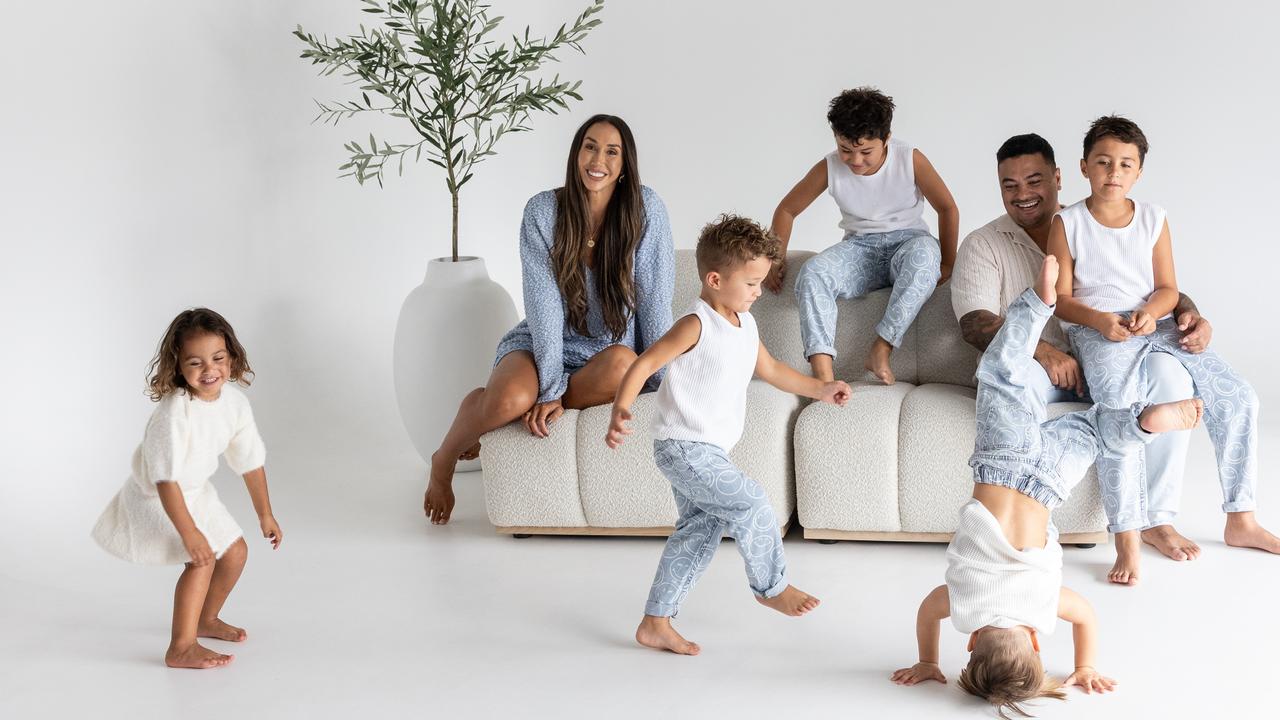
At six weeks, both twins suffered an episodein their sleep in which they stopped breathing and Chontel and Sam had to perform CPR, something they are both certified in due to their business – and something they never imagined they would have to perform on their own children.
“I spiralled into that dark place,” Chontel says.
“But, sometimes you just gotta get through it and that pressure of having staff, having the lease or having a mortgage were actually blessings. That helped me get through it and find joy in the hard work because I had something to fight for.”
Now, Havana and Justice are thriving, eat everything in sight, are “rough as guts” and bulletproof.
“They are so friggin’ incredible … No one would believe that they were premmie,” Chontel says.
Sam and Chontel – who most recently expanded their business to include Neuform, a training program and app – are a true partnership and they want their kids to see that. It’s something neither of them had growing up.
Sam says he’s most proud of the fact the couple have never lost who they are.
“Chon’s always been right there, supporting me and reminding me to enjoy the simple things and not sweat the small stuff,” he says.
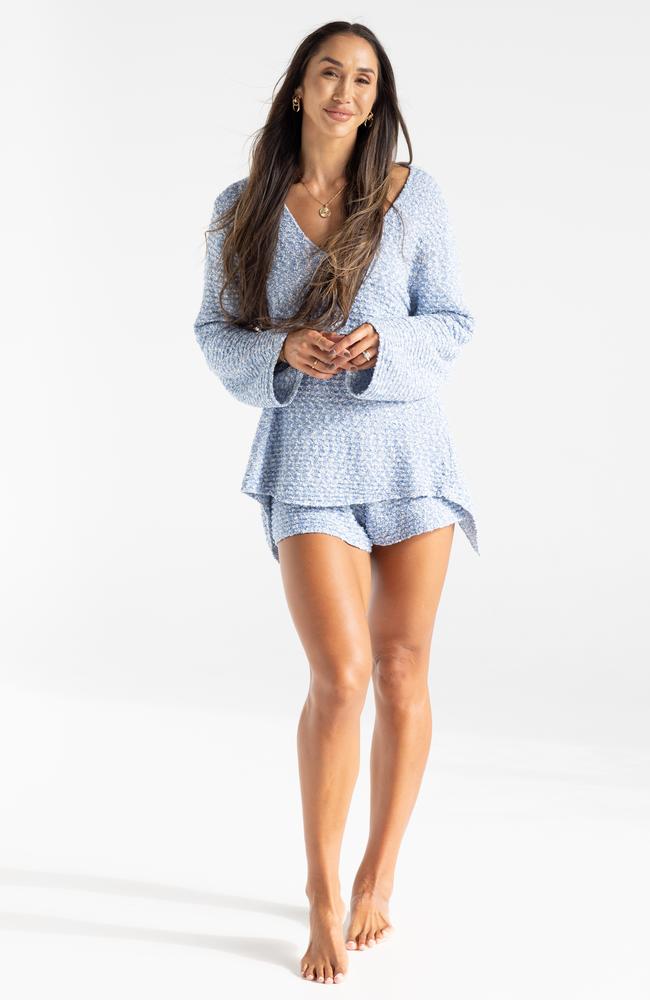
Chontel’s work with Lady Musgrave Trust,which works to reduce homelessness among young Queensland women and children, is incredibly close to her heart.
The Trust provides accommodation and support services to women and children experiencing homelessness and hardship.
Last year, the charity provided more than 8000 nights of safety across its 10 properties and is on track to increase this to 12,000 nights by the end of 2025.
“I believe many women stay in unsafe environments simply because they can’t afford the basic necessities, like a roof over their head,” she says.
“Resources and safe, stable housing are essential to breaking the cycle and giving women and children the opportunity to rebuild their lives with dignity.”
Chontel is aware life could have turned out very differently for her and Sam.
“I never ever want it to look unattainable or to have it come across that what I do is unachievable to women – I was able to do it through hard work and never giving up,” she says.
“One of the best parts about my job is to know that I’ve impacted another family or another woman.” ■


Donut giant’s surprising new move
An Aussie food giant is offering an exclusive new experience for those who prefer their getaways on the sweet side.
Aussies warned of triple virus surge threat
An alarming spike in influenza has hit Australia ahead of winter, with thousands of cases and a sharp rise in deaths. But it’s not the only virus surge to prepare for.